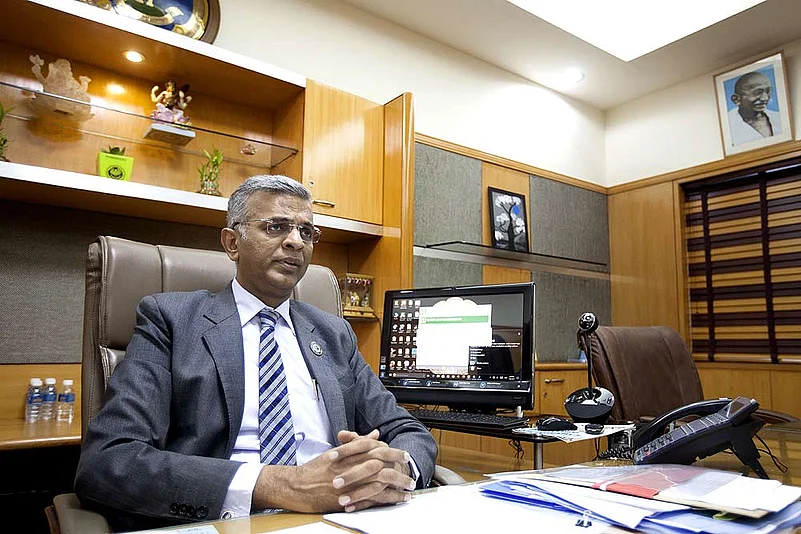Besides monitoring exams for aspiring chartered accountants and registering them, it is also ICAI’s role, as the regulator for CAs and auditors in India, to pin down defaulters and clean up the mess created by top audit firms. While the spotlight is on the role of CAs in siphoning off bank loans and laundering money using shell companies, ICAI president Nilesh S. Vikamsey tells Ushinor Majumdar that the absence of strong laws makes their work tough. Edited excerpts:
What is the role of an auditor in exposing financial scams?
The auditor certifies the true and fair view of the financial statements. Corruption is usually off the book. It is the investigator who digs out corruption and fraud. The distinction between these two roles must be understood clearly.
There were auditor’s lapses in the 2009 Satyam scam…
Based on the reports we have finalised, the audit was not done properly. That was a peculiar case and, to the credit of the profession, we were the first to act despite innumerable difficulties posed through the respondents—the partners, the managers who were charged with the wrongdoing. They were in jail and we were told we could not conduct the hearings on weekdays. We completed the hearing over 48 weekends, over three years, found six people guilty and banned them for life.
If the auditor fails, isn’t it a case of corruption?
It was not necessary for an investigator to dig it out; an audit should have dug out the financial wrongdoing. I am trying to distinguish between a fraud and normal financial wrongdoing. A fraud can be deep-rooted, and if it is committed with the management hand-in-glove with the IT, systems etc together, a normal audit would not discover the fraud. In Satyam, the bank reconciliations were not looked at and it showed that even basic things were not looked at, which would have identified some wrongdoing.
The CBI recently cracked down on some chartered accountants, who were laundering money and helping siphon off loans into shell companies.
These cases have been referred to us and the challenge right now is that the evidence is not enough to identify the role of the CAs, starting with their names. The news has spread, but the evidence is not clear, being slightly disjointed due to multiple agencies working on it. We have asked for a joint meeting with the agencies, so we can gather evidence and take action.
What is your prima facie opinion?
We cannot conclude without evidence. There is a huge amount of oversight in the regulatory body. We have government nominees in the three-man disciplinary committee, without whom we cannot conclude the cases. There is a public misconception that ours is a self-regulatory organisation, but that’s not completely correct. There is a five-member bench that decides disciplinary cases.
Is there a safe regulatory environment for auditors to expose financial wrongdoing?
Absolutely. You must look at the work of SEBI’s qualified audit report review committee, which has reviewed the qualified audit reports of listed companies. Roughly, the audit reports of 400-500 companies have been qualified. The gravity may be different, but the auditors have qualified mistakes of law, accounting, pending permissions, managerial remuneration and so on. For the first time, since the past few years, SEBI has started reviewing what nobody used to see earlier. The general perception will be broken if you review this.
In S. Sreekumar’s petition in the Supreme Court, there is a 2011 ICAI report on multinational network accounting firms. What has been the action taken?
Post Satyam, ICAI forwarded a report on multinational firms to the government with several recommendations. As for our role, we have networking guidelines and are scrutinising whether those were followed or not. The whole process took quite some time, but we are gathering information if some rule was broken or not. No violation has been identified as yet. We are identifying the issues and the types of networking and advertising that are allowed.
Are these networks or firms?
There are two things. For example, KPMG doesn’t come under our jurisdiction, but their member firm BSR will. E&Y may not, but Batliboi will be under our jurisdiction. In PwC, the CA firms will be under our jurisdiction, but not others. The Ministry of Corporate Affairs will look at the non-CA firms.
Do the multinational firms obstruct the regulator?
Not at all. This is being looked into by the Director (Discipline), though it is still an inquiry and not a disciplinary matter yet. The Director (Discipline) has a lot of independence and we don’t interfere. ICAI is examining various issues relating to the operation of multinational accountancy firms in India based on references received from the ICAI council.
SEBI and other regulators have pointed out lapses by top accountancy firms that give audit reports using several disclaimers. Do such cases come up before ICAI?
We have an expert advisory committee for such matters. An explanation is sought from the member firm, following which we take action if there is some wrongdoing. The penalty imposed is based on the gravity of the wrongdoing and the wisdom of the bench.
ICAI does not favour registering foreign firms who want to practise here…
That is incorrect. Our position is that we would welcome them if there is reciprocity. We cannot open up the Indian market without giving a chance to Indian citizens to have a reciprocal arrangement in that country without visa, capital or residence restrictions. It should be on the same terms as they want it here. In all the developed markets, Indian CAs have faced problems. In fact, we want that those countries should open up first for five years before India does. Some discussion on legislative changes regarding this is going on.
What action has ICAI taken against the top accountancy firms in various exposes and scams?
The disciplinary mechanism of ICAI ensures action against the erring member and not against the firm. In Satyam, based on Ramalinga Raju’s 2009 letter to the Board of Directors of Satyam and SEBI highlighting falsification or fudging of the company’s accounts and the subsequent media reports, the disciplinary directorate of ICAI initiated action against the statutory auditors, including the audit in-charge, the CFO and the internal audit department head, who were all members of the institute.
What action did the disciplinary committee take with regard to MP Kirit Somaiya’s letter dated March 21, 2016? He had raised issues on PwC in the context of the Global Trust Bank audit.
In disciplinary matters relating to the Global Trust Bank and the last pending case in the same, though the respondents approached courts of law seeking certain relief, the disciplinary committee conducted its hearings on May 9 and July 18-19 this year in Delhi. The committee completed examination/cross-examination of the witnesses and the hearing will continue on August 23-24.
Somaiya also raised the matter of pending action on PwC regarding Satyam and Vijay Mallya group…
In the Kingfisher matter, ICAI’s Financial Reporting Review Board (FRRB) suo motu scrutinised the financial statements of Kingfisher Airlines Limited relating to four financial years—2009-10 to 2012-13—based on media reports regarding gross financial irregularities, including diversion of funds to the Mallya group. The downfall of Kingfisher Airlines has deeply affected the UB/Mallya group. Reviews of United Spirits Ltd and United Breweries (Holdings) Ltd for 2009-10 to 2014-15 revealed several accounting irregularities in the financial statements. The Financial Reporting Review Board (FRRB) observed several non-compliances with the ‘generally accepted accounting principles’ in the preparation and presentation of financial statements and the disclosures prescribed under statutes and by regulatory bodies. The FRRB also observed non-compliances with the reporting obligations of these companies as well as by its auditors. Considering the gravity, these cases have been referred to Director (Discipline) for taking appropriate action under the law. The board has also sought further information from the auditors.
Why hasn’t ICAI taken action against the firms?
Under the existing law, ICAI cannot exercise jurisdiction over audit firms, but only over the members of the profession. Post Satyam, ICAI has proposed to the government on December 15, 2010, to amend the Chartered Accountants Act, 1949, so as to give ICAI the power to take action against firms of chartered accountants.


























